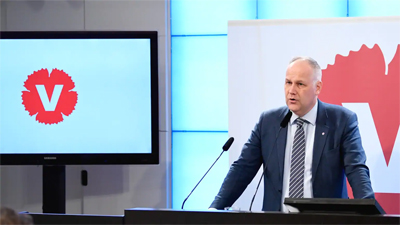pic: svt.se
Fewer jobs, more people looking for jobs, and more people losing their jobs, DN writes, summing up the reasons why the unemployment rate in Sweden is rising again. The unemployment rate is now at 7.2%, higher than it’s been in two years, and it’s across the board – young people, Swedish-born, foreign-born, women and men.
On the other hand, however, the Swedish Public Employment Office (Arbetsförmedling) writes, there are still a lot of jobs out there – if you’re willing to “broaden your profession” and/or move. Annika Sundén, chief analyst at the Employment Office, writes that the job market has been very strong the last few years, and is now coming down from a high. Suzanne Spector, senior analyst at Nordea, SvD writes, is in agreement, saying that jobs are still being found – just there are more looking for them, and it takes more time.
The Swedish Trade Union Organization, however (Landsorganisation, LO), is criticising the government for acting too slowly, for one thing. It also criticises the Moderate and Christian Democratic parties for the budget they pushed through after the 2018 election, plus the government for the January Agreement and going along with the demands from the Center and Liberal parties to reform the Employment Office (reforms that were later cancelled under threat, see this post, this post and this post).
Another critique that LO directs towards the government is for cancelling the “extra service” jobs (extratjänster) that were doled out by the Employment Office. Extratjänster jobs were jobs in social services like health care and elder care which were heavily subsidized by the government. They were created to help people who are otherwise “a long way from the job market” (långtidsarbetslösa) to get into, or back into, the job market. The program was severely panned since permanent jobs were seldom offered to the persons after their subsidized employment was over. The jobs did raise the employment numbers, and kept some people in jobs, so the measure can (in some ways) be put down as a success, but many thought it was an expensive program that was merely obfuscating the real employment numbers.
Lars Jagrán, SvD reports, analyst at the Confederation of Swedish Enterprise (better known as Svenskt Näringsliv), remarked that the higher unemployment was expected, but was sorry nonetheless. “Those that haven’t gotten work during the good economy are going to have a harder time now, which will make integration even more difficult. ”
The Social Democrats don’t seem so worried about the numbers. Minister for Employment, Eva Nordmark, also said the higher numbers were expected and that counter measures have been put in place: 1.3 billion kronor has been earmarked for a jobs package, 900 million kronor is set to strengthen the Employment Office, and five million has been directed to the municipalities to help strengthen their economy.
“As the Minister for Employment, I feel proud that the government is meeting the situation that we see around us – we’re not at a loss, saying “goodness, oh dear” Nordmark said (oj, hoppsan). “We know what’s going on, our finances are good and we have been able to pull our efforts together now when we see a downturn on the way.”
It is precisely that Sweden’s economy is, and has been, so strong that the Left party is pushing to use that money – and to borrow more – to send out to the municipalities. The Moderate party has also just gone on record saying that more money has to be sent to the municipalities to prevent the reduction in services in the health, school, and elder care sectors: They may even in the near future join forces (as they did in regards to the Employment Office reform) to threaten the government into sending more funds to the local governments. The difference in their approaches is that the Left party wants the government to take the required monies out of savings, while the Moderate party would rather keep the savings and take it out of the foreign welfare budget.
Way back in 2014, the Social Democratic party went into the election with a promise that Sweden would have the lowest unemployment in Europe in 2020. Not going to happen. But it wasn’t a smart thing to promise in the first place.






